- Home
- Iain Banks
Whit
Whit Read online
Whit
Iain Banks
A little knowledge can be a very dangerous thing…
Innocent in the ways of the world, an ingénue when it comes to pop and fashion, the Elect of God of a small but committed Stirlingshire religious cult: Isis Whit is no ordinary teenager.
When her cousin Morag - Guest of Honour at the Luskentyrian's four-yearly Festival of Love - disappears after renouncing her faith, Isis is marked out to venture among the Unsaved and bring the apostate back into the fold. But the road to Babylondon (as Sister Angela puts it) is a treacherous one, particularly when Isis discovers the Morag appears to have embraced the ways of the Unsaved with spectacular abandon …
Truth and falsehood; kinship and betrayal; 'herbal' cigarettes and compact discs - Whit is an exploration of the techno-ridden barrenness of modern Britain from a unique perspective.
'Fierce contemporaneity, an acrobatic imagination, social comment, sardonic wit ... the peculiar sub-culture of cult religion is a natural for Banks, and Luskentyrianism is a fine creation' The Times
'One of the most relentlessly voyaging imaginations around' Scotsman
'Banks is a phenomenon ...I suspect we have actual laws against this sort of thing, in the United States, but Iain Banks, whether you take him with the "M" or without, is currently a legal import' William Gibson
'Entertaining ... comically inspired' Guardian
Whit
Iain Banks
CHAPTER ONE
I was in my room, reading a book.
I turned a page. The curved shadow of one candle-lit white surface fell over another and the action made a small sharp rustling noise in the silence. Suddenly, a dizziness struck me, and I was acutely aware of the paper's thin dryness, rough against the skin of my fingers and seemingly conducting some powerful, disorienting energy from it to me. I sat as if stunned for a moment, while the unbidden memory of my first Healing coursed through me, suffused with the light of a distant season.
It was a hot summer's day; one of those close, still afternoons when distant haze over the hills or across the plain might become thunder before the evening, and stone walls and outcrops of naked rock will give off small bursts of sweet, heated air when you walk close by. My brother Allan and I had been playing daringly far away from our home at the farm, and daringly close to a main road. We had been stalking rabbits in the fields and looking for birds' nests in the hedgerows, all without success. I was five, he a couple of years older.
We found the fox lying in a just-cut field on the far side of the hedge from the road, where cars and trucks roared past in the sunlight.
The animal was small and still and there was dried blood round its nose and mouth. Allan poked the fox's body with a stick and pronounced it long dead, but I looked and looked and looked at it and knew that it could still live, and so went forward and stooped and raised it up, gathering its stiffened form into my arms and burying my nose in its fur.
Allan made noises of disgust; everybody knew foxes were covered in fleas.
But I felt the flow of life, in me and in the animal. A strange tension built in up me, like a blessed opposite of bottled-up anger, germinating, budding and blossoming then flowing out of me like a glowing beam of vitality and being.
I felt the animal quicken and stir in my hands.
In a moment it jerked, and I set it down on the ground again; it wobbled to its feet and shivered once, looking shakily around. It growled at Allan and then leaped away, vanishing into the ditch before the hedge.
Allan stared at me wide-eyed with what appeared to be horror and - for all that he was the boy and two years my senior - looked very much as though he was about to cry. The muscles at the hinge of his jaws, beneath his ears, quivered, spasming. My brother dropped his stick, shouted incoherently and then also ran off through the brindle stalks towards the farm.
I was left alone with a feeling of unutterable contentment.
Later - years later, with the benefit of a more mature perspective on that vivid childhood instant - I was to recall precisely (or at least seem to) what I had felt when I'd lifted the fox off the ground, and, troubled, ask myself whether whatever Gift I had could act at a distance.
… The dizzying moment passed, the turned page settled against those read before it. Memory - the gift we all share, and which certainly does act at a distance - released me back to the present, and (though I didn't know it at the time) what was the start of my own tale.
* * *
I shall introduce myself: my name is Isis. I am usually called Is. I am a Luskentyrian.
* * *
I shall begin my story properly the day Salvador - my Grandfather and our Founder and OverSeer - received the letter which set in motion the various events described herein; it was the first day of May 1995, and all of us in the Order were already caught up in the preparations for the Festival of Love due to take place at the end of the month. The quadrennial Festival, and especially the implications it would involve for me personally, were much on my mind then, and it was with a sense of impending relief and only a hint of guilt that I was looking forward to departing the Community for my weekly walk to Dunblane, its cathedral, and the Flentrop organ.
Our home lies in a loop of the river Forth a number of miles upstream from the town of Stirling. The river - rising from a confluence just above Aberfoyle - meanders like a brown rope the Creator has dropped haphazardly across the ancient green flood-plain which forms the eastern flank of Scotland's pinched waist. The river curves, swerves, doubles back and bows round again in a series of convoluted wriggles between the Gargunnock escarpment to the south and the long, shallow slope of collectively untitled hills to the north (my favourite of which, for its name alone, is Slymaback); it passes through Stirling itself, swelling gradually, and continues to snake its way to Alloa, where it broadens out further and begins to seem more like part of the sea rather than a feature of the land.
Where it passes us, the river is deep, not yet tidal, smoothly flowing unless in spate, often soupy with silt and still narrow enough for a child to throw a stone all the way across, from one muddy, reeded bank to the other.
The pouch of raised land where we live is called High Easter Offerance. The Victorian mansion, the older farmhouse, its outbuildings and associated barns, sheds and glasshouses as well as the various abandoned vehicles that have been pressed into service as additional accommodation, storage or greenhouses, together take up perhaps half of the fifty or so acres the river's loop encompasses, with the rest given over to a small walled apple orchard, two goat-cropped lawns, a stand of Scots pine and another of birch, larch and maple, and - where the old estate slopes down to the river - a near-encircling wilderness of weeds, bushes, muddy hollows, giant hog weeds and rushes.
The Community is approached from the south across a bow-arched bridge whose two main girders each bears an unidentifiable coat of arms and the date 1890. The bridge was once quite capable of supporting a traction engine (I have seen photographs) but its wooden deck is now so thoroughly rotten there are numerous places where you can see through its eaten timbers to the swirling brown waters below. A narrow pathway of roughly nailed-down planks makes a pedestrian route across the bridge. On the far side of the bridge, set amongst the crowding sycamores on the raised bank opposite the Community proper, is the small turreted house where Mr Woodbean and his daughter Sophi live. Mr Woodbean is our gardener, though the house he lives in belongs to him; the estate of High Easter Offerance was gifted to my Grandfather and the Community by Mr Woodbean's mother on condition she and her descendants possessed title to the turret house. I am fond of telling people Sophi is a lion-tamer, though her official title is Assistant Animal Handler. She works at the local safari park, a few miles across the fields, near Doune.
Beyond the
Woodbeans' house, the overgrown driveway winds through the trees and bushes to the main road; there tall, rusted-shut iron gates look out over a semicircle of gravel where Sophi's Morris Minor sits when not elsewhere, and the postman's van parks when he comes to deliver mail. A single small gate to one side gives access to the dank, tree-dark driveway within.
North, behind the Community, where the coiling river almost meets itself at the draw-string of our enpursement, the land dips towards the line of the old Drymen to Bridge of Allan railway line, which describes a long grassy ridge between us and the major part of our policies beyond, a rich quilt of flat, fertile arable land comprising some two thousand acres. There is a gap in the old railway line where a small bridge, long since removed, had given access to the fields back when the line had been operational; my route to the cathedral that mist-bright Monday morning would begin there, but first I would break my fast.
* * *
Our secular lives tend to centre around the long wooden table in the extended kitchen of the old farmhouse, where the fire burns in the open range like an eternal flame to domesticity and the ancient stove sits darkly in one corner, radiating heat and a comfortingly musty odour, like an old and sleepy family dog. At this point in the morning at this time of the year, the kitchen is bright with hazy sunlight falling in through the broad extension windows, and crowded with people; I had to step over Tam and Venus, playing with a wooden train set on the floor near the hall door. They looked up when I entered the kitchen.
'Beloved Isis!' Tam piped.
'Buvid Ice-sis,' the younger child said.
'Brother Tam, Sister Venus,' I said, nodding slowly with mock gravity. They giggled embarrassed, then returned to their play.
Venus's brother, Peter, was arguing with his mother, Sister Fiona, about whether today was a Bath Day or not. They too stopped long enough to greet me. Brother Robert nodded from the open courtyard door, lighting his pipe as he stepped outside to get the horses ready; his nailed boots clicked across the flagstones. Clio and Flora ran yelping and screaming around the table, Clio chasing her elder sister with a wooden spoon and followed by Handyman, the collie, his eyes wide, his long pink tongue flapping ('Girls…' the girls' mother, Gay, said with weary exasperation, looking up from the Festive banners she was sewing, then seeing me and wishing me good morning. Her youngest child, Thalia, stood on the bench beside her, gurgling and clapping her hands at the show her sisters were putting on). The two children hurtled past me, shrieking, with the dog skittering across the tiles behind them, and I had to lean back against the warm black metal of the stove.
The stove was built for solid fuel but now runs on methane piped in from the waste tanks buried in the courtyard. If the fire, with its giant black kettle swung over the flames, is our never-extinguished shrine, then the stove is an altar. It is habitually tended by my step-aunt Calliope (usually known as Calli), a dark, stocky, dense-looking woman with beetling black brows and a tied-back sheaf of thick hair, still raven-black without a trace of silver after her forty-four years. Calli is particularly Asian in appearance, as though almost none of my Grandfather's Caucasian genes found their way to her.
'Gaia-Marie,' she said when she saw me, looking up from her seat at the table (Calli always refers to me by the first part of my name). In front of her, a knife glittered back and forward over the chopping block, incising vegetables. She rose; I put out my hand and she kissed it, then frowned when she saw my travelling jacket and my hat. 'Monday already?' She nodded, sitting again.
'It is,' I confirmed, placing my hat on the table and helping myself to porridge from the pot on the stove.
'Sister Erin was in earlier, Gaia-Marie,' Calli said, returning to the slivering of the vegetables. 'She said the Founder would like to see you.'
'Right,' I said. 'Thank you.'
Sister Anne, on breakfast duty, left the toasting rack at the fire and fussed over me, dropping a dollop of honey into my porridge and ensuring I got the next two bits of toast, plastered with butter and slabbed with cheese; a cup of strong tea followed almost immediately. I thanked her and pulled up a seat beside Cassie. Her twin, Paul, was on the other side of the table. They were deciphering a telephone scroll.
The twins are Calli's two eldest, an attractive mixture of Calli's sub-continental darkness and the Saxon fairness of their father, my uncle, Brother James (who has been performing missionary work in America for the last two years). They are my age; nineteen years. They both rose from their seats as I sat down. They quickly swallowed mouthfuls of buttered bread and said Good morning, then returned to their task, counting the peaks on the long roll of paper, converting them into dots and dashes and then gathering those into groups that represented letters.
A younger child is usually given the task of collecting the long scroll of paper from the Woodbeans' house each evening and bringing it back to the farm for deciphering. This had been my duty for a number of years - I am a few months younger than the twins, and even though I am the Elect of God I have, quite properly, been brought up to be humble in the sight of the Creator and to learn some of that humility through the accomplishment of common, simple tasks.
I recall my scroll-collection duties with great affection. While the trip to the house on the far side of the bridge could be unpleasant in foul weather - especially in the winter darkness, carrying a wind-swung lantern across the decaying iron bridge with the swollen black river loud below - I was usually rewarded with a cup of tea and a sweet or a biscuit in the Woodbean household, and there was anyway the fascination of just being in the house, with its bright electric lights shining into the corners of the rooms and the old radiogram filling the sitting room with music from the airwaves or from records (Mr Woodbean, who is a sort of fellow traveller where our faith is concerned, draws the line at television; his concession to my Grandfather's strictures on the modern world).
I was under instructions not to linger in the house longer than necessary, but like most of us charged with the scroll run I found it hard to resist staying a while to soak in that shining, beguiling light and listen to the strange, distant-sounding music, experiencing that mixture of discomfort and allure younger Luskentyrians commonly endure when confronted with modern technology. This was also how I came to get to know Sophi Woodbean, who is probably my best friend (before even my cousin Morag), even though she lives mostly amongst the Blands and - like her father - is what my Grandfather would call Only Half-Saved.
Cassie ticked off another group of signals and glanced at the grandfather clock in the corner.
It was almost six o'clock. Unless the scroll looked like containing an especially urgent signal, Brother Malcolm would be calling the twins away to their work in the fields soon, where up to a dozen others of our Order were probably already working. At the far end of the table, the primary-age youngsters were trying to eat at the same time as feverishly copying each other's homework before Uncle Calum rang the bell for class to begin in the mansion house across the yard. The secondary-school children were almost certainly still asleep; the bus which would stop at the end of the driveway to take them to the Gerhardt Academy at Killearn wouldn't arrive for another hour and a half. Astar - Calli's sister - was likely busy supervising bed-making and laundry collection while Indra, her son, was probably to be found tinkering with some piece of pipework or joinery, if not attending to the Festive Ale being prepared in the hop-fragranced brew-house in the barn beyond the courtyard's western corner. Allan, my elder brother, was almost certainly already in the Community office, also across in the mansion house, keeping the farm records up to date and giving Sister Bernadette or Sister Amanda letters to type.
I finished my breakfast, gave the plates to Brother Giles, who was on washing-up duty that day, said a general Goodbye to all in the kitchen - Sister Anne fussed over me and thrust an apple and a couple of pieces of haggis pakora wrapped in greaseproof paper into my pocket - and crossed the yard to the mansion house. The mist above was only faint, the sky beyond clear blue. Steam
rose from the wash house, and Sister Veronique called out and waved to me, a laundry basket piled and heavy on her hip. I waved to her, and to Brother Arthur, holding one of the Clydesdales while Brother Robert and Brother Robert B. adjusted its harness.
The men called me over to look at the horse. Dubhe is the largest of our Clydesdales but also the laziest. The two Roberts reckoned he was limping a little but weren't sure.
I have a way with animals as well as people, and if I have anything that can be said to resemble a duty in the Community it lies in helping to soothe some of the pains, injuries and conditions people and beasts are prone to.
We walked the horse round a little out of his harness and I clapped his flanks and held his head and talked to him for a while, rubbing my face against his while his breath thundered out of his black-pink nostrils in hay-sweet clouds. Eventually he nodded once, taking his huge head out of my grasp and then holding it high, looking around.
I laughed. 'He's fine,' I told the men.
I crossed to the mansion house; this is the rather grand title given to the dwelling Mr Woodbean's father had built to supersede the original farmhouse at the turn of the century. It is built of chiselled grey-pink sandstone rather than the rough, undressed stone of the earlier building, and its three storeys stand taller, better lit and devoid of whitewash. It was reduced to a burned-out shell some sixteen years ago, in the fire that killed my parents, but we have rebuilt it since.
Inside, Brothers Elias and Herb, two muscular American blonds were on their hands and knees, buffing the hall floor. The air was filled with the sharp, clean smell of the polish. Elias and Herb are converts who came to us after hearing about our Community from Brother James, our missionary in America. They both looked up and smiled the broad, perfect smiles which they have assured us (almost proudly, it seemed to me) cost their respective parents many thousands of dollars.

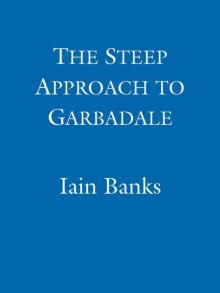 The Steep Approach to Garbadale
The Steep Approach to Garbadale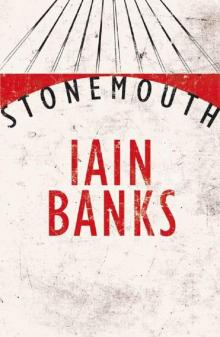 Stonemouth
Stonemouth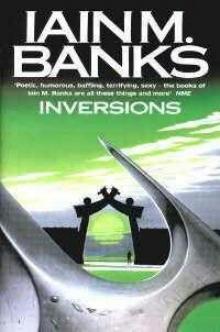 Inversions c-6
Inversions c-6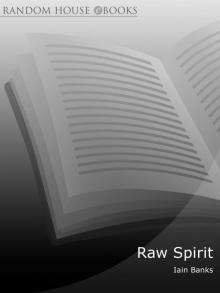 Raw Spirit: In Search of the Perfect Dram
Raw Spirit: In Search of the Perfect Dram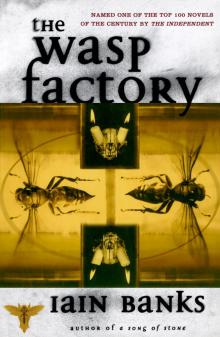 The Wasp Factory
The Wasp Factory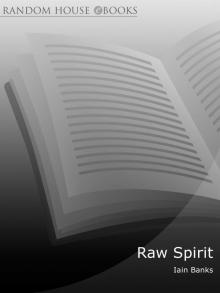 Raw Spirit
Raw Spirit Walking on Glass
Walking on Glass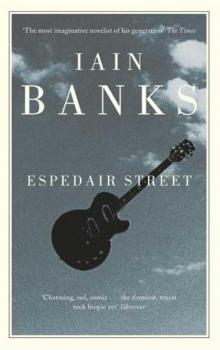 Espedair Street
Espedair Street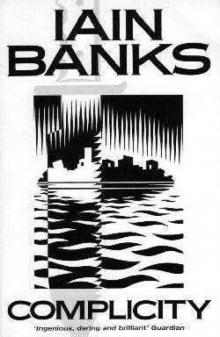 Complicity
Complicity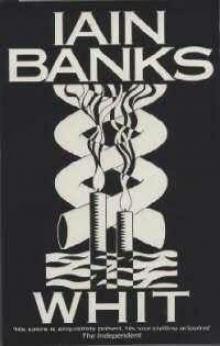 Whit
Whit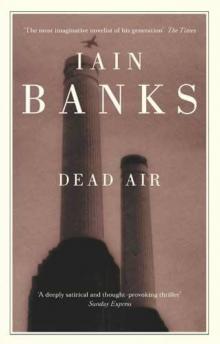 Dead Air
Dead Air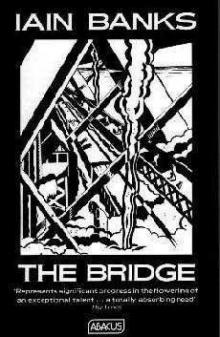 The Bridge
The Bridge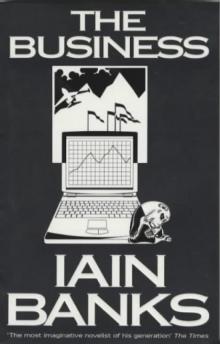 The Business
The Business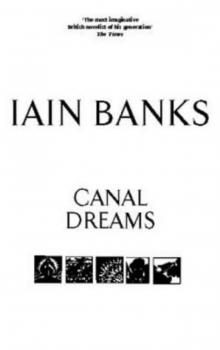 Canal Dreams
Canal Dreams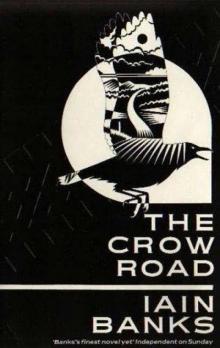 The Crow Road
The Crow Road